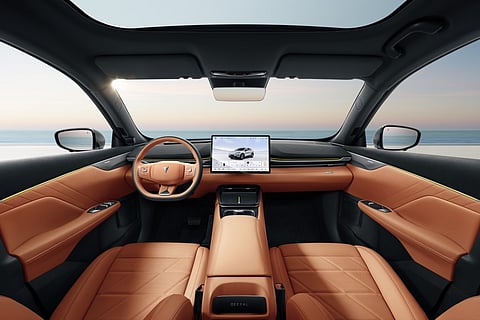Chinese electric vehicles accelerate into UAE as market share soars
Chinese brands expected to dominate Middle East car market by 2030

Dubai: The UAE is witnessing a significant influx of advanced electric vehicles from China, with brands like BYD, Geely, Chery, MG, and Deepal leading the charge. The trend aligns with a recent analysis by global consulting firm AlixPartners, which predicts that Chinese automotive brands will capture a staggering 34 per cent market share in the Middle East and Africa (MEA) region by 2030, up from just 10 per cent in 2024.
According to the report, consumers in the region, particularly in Saudi Arabia and the UAE, have grown to trust Chinese automotive brands significantly. Alessandro Massaglia, partner and managing director at AlixPartners, said that the “technical prowess” and “competitive pricing” of Chinese vehicles are key factors attracting Middle Eastern buyers.
However, in many cases, vehicles sold domestically in China do offer more advanced features, particularly in areas such as autonomous driving, connectivity, and infotainment.
China is at the forefront of developing and deploying advanced driver-assistance systems (ADAS) and autonomous driving technologies, and Chinese consumers are highly demanding in terms of digital connectivity and in-car technology. Moreover, the Chinese government has been strongly pushing for the adoption of electric vehicles and smart car technologies.
Top features
Recently, the launch of Al Deepal S05, an intelligent electric SUV launched in the UAE by Al Tayer Motors, hopes to bridge that gap. According to Yin, Deputy General Manager of Changan Automobile's Middle East and Africa Division, the S05 is designed to appeal to the “mid-range, tech-forward segment” of the UAE market.
Available in both a purely electric version (BEV) with a 460 km range and a range-extended electric vehicle (REEV) offering over 900 km total range, the S05 boasts features typically found in higher-end cars.
These include an augmented reality head-up display (AR-HUD), a 15.4-inch central screen, and a powerful Qualcomm Snapdragon 8155 chip. The vehicle also offers smart app-based controls, over-the-air updates, and advanced driver assistance systems (ADAS), aligning with the report’s observation that ADAS Level 2 and above were included in nearly 60 per cent of passenger vehicle sales in China in 2024.
China’s most advanced cars
Yin stated that the S05 is positioned to compete not only with other EVs like the Tesla Model Y and Hyundai IONIQ 5 but also with internal combustion engine (ICE) SUVs such as the Toyota RAV4, aiming to make electric mobility more accessible to UAE consumers.
With an initial sales target of 3,000 units in the first year and a longer-term goal of over 10,000 units in the next 3-5 years, Yin said he is confident in its growth prospects.
Moreover, as countries like Saudi Arabia set ambitious targets for EV adoption as part of their Vision 2030 initiatives, the increasing appetite for innovation and investments in future mobility is expected to drive even deeper partnerships with Chinese brands.
For example, while Huawei is not a traditional car manufacturer, the Chinese technology giant has rapidly established itself as a crucial Tier 1 supplier and technology partner in the automotive sector, focusing on intelligent and electric vehicle solutions. The company has a significant presence in the UAE.
This pivot leverages Huawei's expertise in telecommunications, software, and hardware to provide advanced technologies for the next generation of automobiles. One of Huawei's flagship automotive offerings is its HarmonyOS-powered intelligent cockpit system.
The company is also actively developing a range of autonomous driving technologies, including solutions encompassing sensor fusion, utilising lidar, radar, and cameras, along with powerful computing platforms and intelligent software algorithms.



